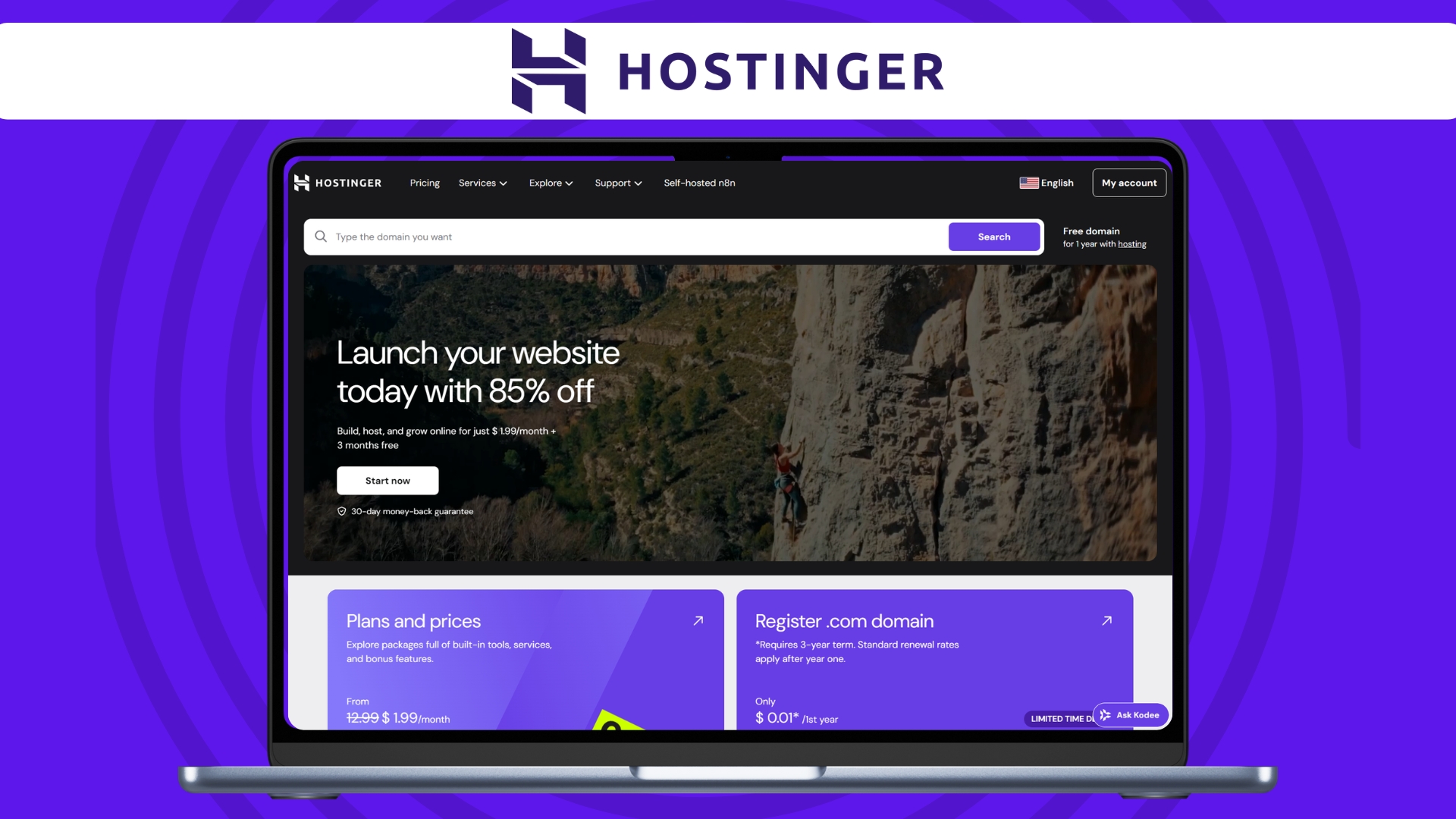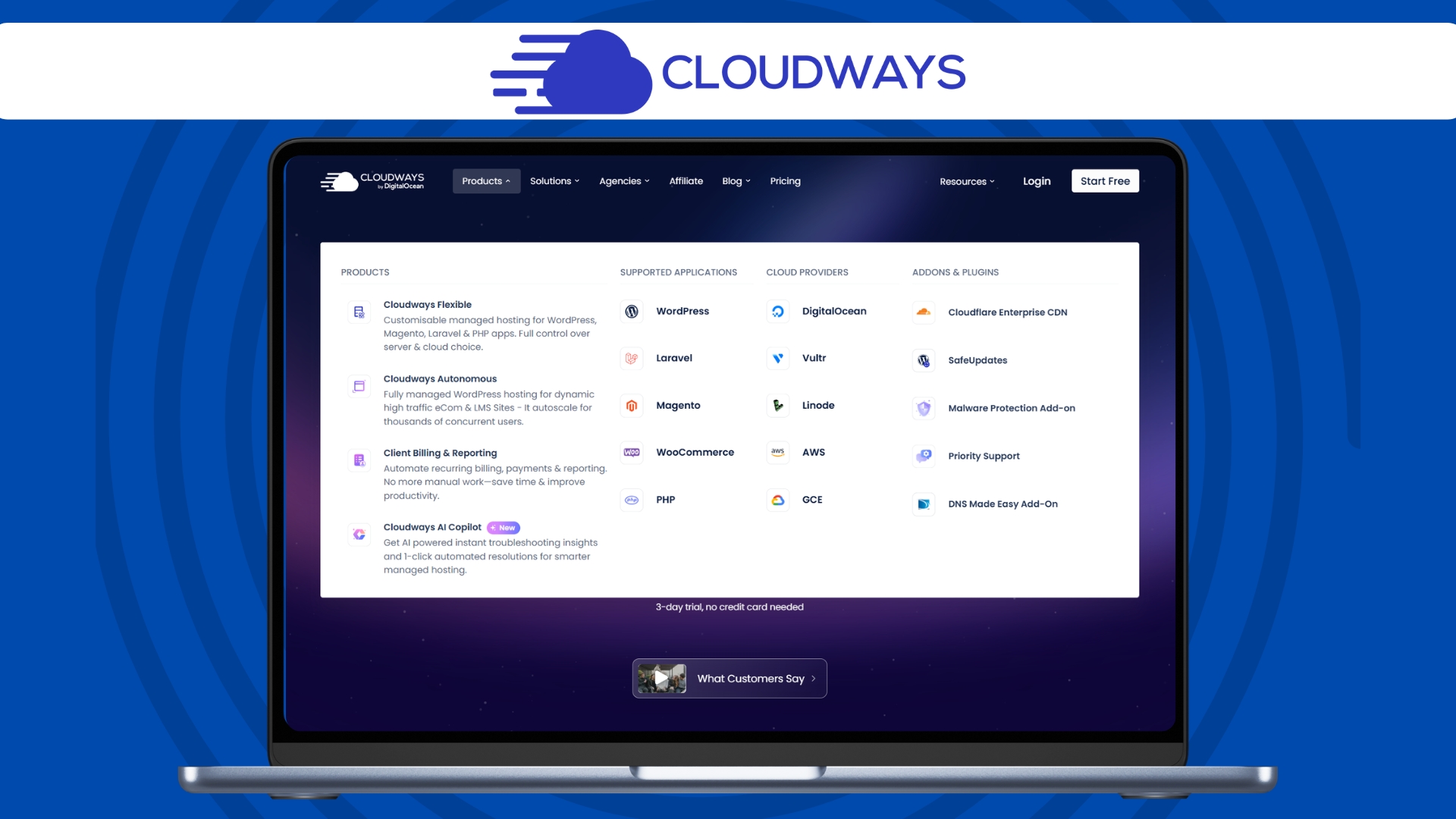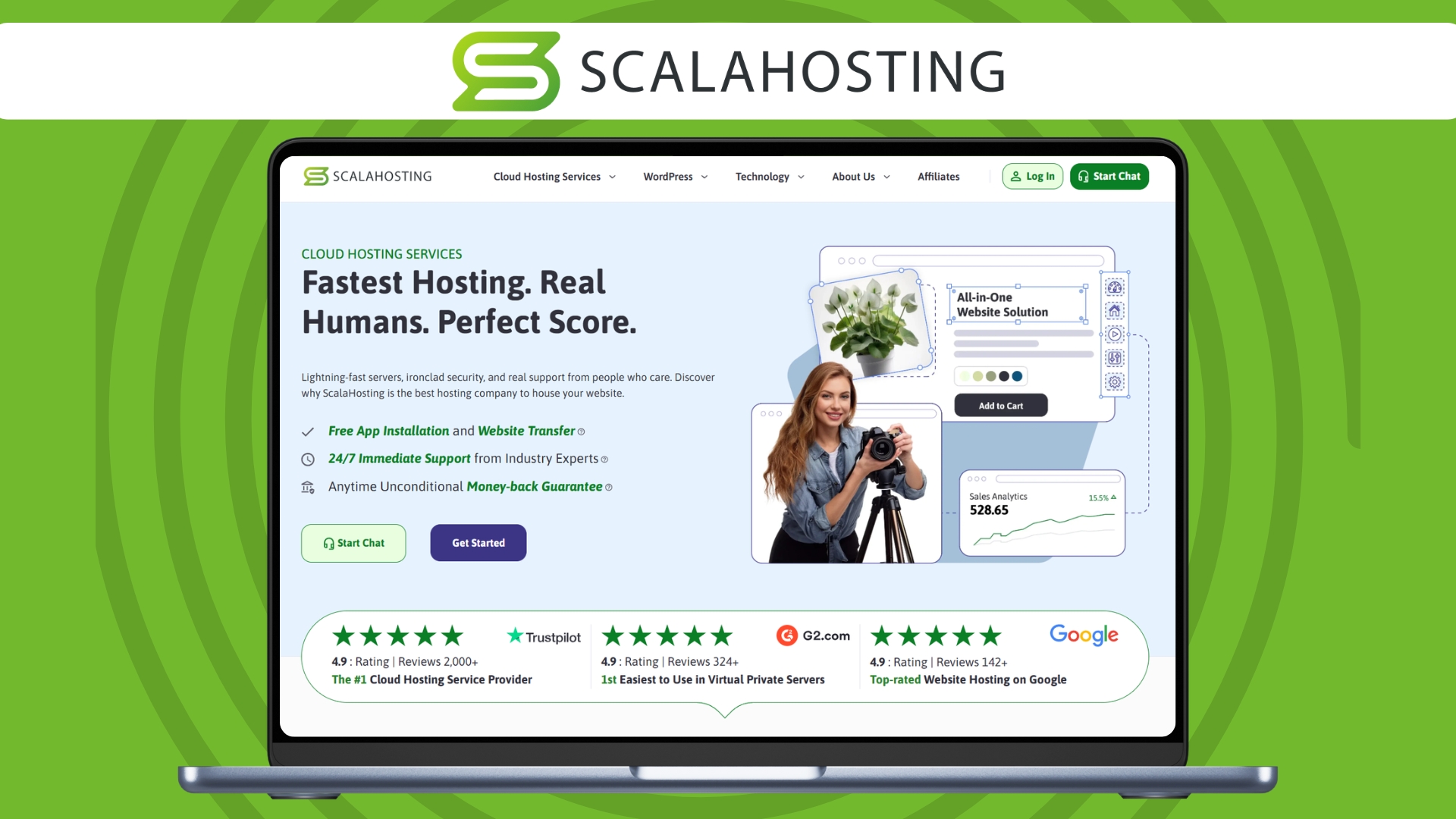Best managed VPS hosting
The best managed VPS hosting for power and convenience

Sign up for breaking news, reviews, opinion, top tech deals, and more.
You are now subscribed
Your newsletter sign-up was successful
The best managed VPS hosting stands out as the perfect combination between performance and convenience making it one of the best web hosting types. It allows you to reap the benefits of the best VPS hosting (more power, complete control, and better security) without having to dig deep into any of the technical complexities that come with running the server.
Kamatera Windows hosting: Great value PLUS 30 days free
Kamatera's secure, user-friendly cloud infrastructure is perfect for businesses that require a managed VPS server. Set up your server exactly how you want it, with full root access and 24/7 expert support if something goes wrong.
However, not all ‘managed’ hosts are created equal. There are different levels of management, with some providers limiting their support to server-level maintenance, which includes regular backups, updates, and security patches. On the other hand, there are hosts who offer application-level management, meaning they’ll even tap into the code to resolve your queries.
If you’re confused about which VPS hosting is the best for your needs, this guide is for you. We’ve handpicked the 6 best managed VPS hosting providers based on management levels, hosting architecture, ease of use, customer support, and value for money.
The best managed VPS hosting providers of 2025
Best managed VPS overall
ScalaHosting
Our expert review:
Reasons to buy
Reasons to avoid
ScalaHosting is the #1 managed VPS hosting because it’s one of the very few providers that offer complete hands-on support, and that, too, at a reasonable price tag. Other hosts limit their VPS management service to just server-level tasks, such as updating and patching the operating system, configuring and managing the firewalls, and monitoring CPU usage. ScalaHosting goes a step further and also takes care of application-level issues, such as fixing a broken WordPress plugin, resolving code-level bugs, debugging website errors, and installing and configuring third-party tools.
You can get started with ScalaHosting for just $29.95/month (two-year commitment, renews at $49.95/month). This plan comes with 2 CPU cores, 4 GB RAM, and 50 GB NVMe SSD storage, as well as automatic offsite backups, CloudFlare CDN, and brute-force protection. If you’re a large business looking for more power, you’ll be glad to learn that ScalaHosting offers excellent customizability. You can build your own cloud VPN, which can have as many as 24 CPU cores, 64 GB RAM, and 2,000 GB storage.
ScalaHosting also comes with its very own control panel called SPanel. It’s one of the best cPanel alternatives, seeing as it’s not only more lightweight and feature-packed but also gives you more control and better security than cPanel. The best part? SPanel is included with all ScalaHosting VPS plans, whereas cPanel costs extra (starting at $26.95 for 5 accounts).
Last but not least, users will also appreciate ScalaHosting’s anytime unconditional money-back guarantee. The provider promises to offer prorated refunds irrespective of when you cancel your subscription. Purchased a two-year plan but want to cancel after six months? ScalaHosting will only charge you for the six months and return the rest.
Read our full ScalaHosting review
Best AI managed VPS

Reasons to buy
Reasons to avoid
Hostinger offers four VPS plans, with the cheapest one priced at just $4.99/month for a two-year term (renews at $13.99/month) and offering 1 vCPU core, 4 GB RAM, and 50 GB storage. On the other end of the spectrum, there's the $19.99/month plan (renews at $59.99/month), which comes with 8 vCPU cores, 32 GB RAM, and 400 GB storage.
At first glance, you might think that this is just the base VPS pricing and that management services would cost extra. However, that’s not the case, and Hostinger is hands down one of the best value VPS hosts on the market right now.
It’s able to pull this off with its AI-powered assistant, Kodee. Think of it as your personal VPS manager who’s available round the clock and can perform pretty much any management task, including installing applications or updating the PHP version. The best part? It understands commands in plain English, meaning you don’t need to be adept at writing out technical commands, scripts, or using server control panels. For example, you can put Kodee to work by simply typing out, “Install WordPress.”
That said, there’s a noticeable caveat attached to this. Technically, your VPS is still unmanaged, seeing as there’s no human team behind the scenes looking after your server or application, which is usually the case in managed hosting. So, in the unlikely scenario that Kodee doesn’t come to your rescue, you’re really out there on your own. Also, troubleshooting complex issues and rejigging advanced security setups might fall outside the purview of the AI bot. All this means that, ideally, you should have a fair bit of technical expertise so that you can swim through a rainy day unscathed.
Read our full Hostinger review
Best managed VPS for WordPress

Reasons to buy
Reasons to avoid
Bluehost might be my recommendation for best WordPress hosting but when you need a VPS for WordPress, my top choice is Cloudways.
This mostly thanks to Cloudways Copilot. This isn’t just an AI chatbot that solves human queries it is a full-fledged engineer that works for your 24/7.
Copilot constantly monitors critical server components such as disk space usage, webstack performance, backup issues, host health, and disk inode, and identifies any issues in real time. It then sends you an instant notification and alert, informing you about the issues. And this isn’t a vague alert saying, ‘there’s a problem somewhere’. Cloudways Copilot is rather detailed specifying the exact problem along with the location.
Cloudways then goes a step ahead and runs a detailed AI-driven diagnostic to identify the root cause of the issue at hand, explaining in detail the ‘why’ side of the problem. With more than 13,000+ insights generated during previews, the AI demonstrated a whopping 90% accuracy rate. Cloudways also suggests one-click automated resolution, thanks to its SmartFix function, which helps you apply the best-practice solutions in just a single click.
Since Cloudways Copilot is a new feature, there’s a promotional offer running where you get 5 AI Insights Credits and 2 SmartFixes per month for the first 6 months. After this, you’ll have to shell out $9.99/month for 12 AI credits (Growth Plan) and $19.99/month for 25 credits (Scale plan). Each Copilot Insight report and Smartfix consumes 1 credit each.
Copilot is included with all Cloudways Flexible plans (as of now), which offer customizable managed hosting where you can fully customize the cloud provider and plan as per your needs. For instance, the Micro plans start at $14/month, offering 1GB RAM, 1 vCPU, 25GB NVMe storage, and 1TB transfer bandwidth.
Read our full Cloudways review
Best managed VPS for enterprise
Reasons to buy
Reasons to avoid
Kamatera is our top choice for enterprises thanks to its insane customizability and volume-based discounts. You can choose your desired combination of vCPUs, RAM, storage, OS, control panels, and data center location, either for yourself or for your customers, i.e., if you’re a reseller.
You can choose from three management levels: Unmanaged (free), Pro Managed ($50 per month), and Premium Managed ($150 per month). Pro Managed should cut it for most businesses, seeing as it comes with OS, web, protocol, and ping monitoring, but if you also require custom, application, and hardware monitoring, Premium Managed is the way to go. Kindly keep in mind that this is just the cost of Kamatera’s management service, and it’ll be an extra expense on top of your chosen VPS, whose pricing Kamatera doesn’t reveal publicly.
Kamatera has 20+ data centers located all around the world, including Asia, Europe, North America, and the Middle East, which makes it perfect for large organizations with a global customer base. No matter where your international clients are, you’ll be able to offer them a nearby server, thereby reducing latency and improving speeds.
Coming to Kamatera’s cost-efficiency, it doesn’t require an upfront investment or a fixed contract, unlike other providers. You have the flexibility to pay on a monthly or hourly basis, which has become increasingly rare in the hosting industry.
Another feature we really liked is Kamatera’s 30-day free trial. While other providers settle for a money-back guarantee, Kamatera’s free trial (meaning you don’t pay anything upfront, unlike money-back guarantees) makes it super easy to try the service out without risking a single penny. That said, the provider does ask you to enter your credit card details, but you won’t be billed if you cancel on time.
Read our full Kamatera review

Liquid Web
Our expert review:
Reasons to buy
Reasons to avoid
Founded in 1997, Liquid Web stands out as the best cloud hosting provider. Almost every single hosting product it offers (VPS included) is cloud, which makes it ideal for businesses that want to focus on their growth while the hosting provider looks after the server startups, OS and security updates, and performance monitoring, as well as backups and application optimization.
Liquid Web’s cloud architecture comes built-in with redundancy. This means that your website or application isn’t hosted on a single server. Instead, your data is replicated and stored across multiple machines in various locations, so even if one server fails, your website will keep running.
Speaking of minimizing downtime, Liquid Web also offers a 100% uptime guarantee. Plus, according to Liquid Web’s Service Level Agreement, you’ll get free credits in case the provider doesn’t live up to its claims. This alone makes Liquid Web one of the most reliable VPS hosts going around.
There’s also auto scaling, a cornerstone of any cloud hosting environment. Liquid Web has done a fantastic job with its autoscaling in that it constantly monitors your website traffic and automatically scales your server resources when it notices a spike in incoming traffic. This is important because it reduces the possibility of site slowdowns and crashes.
Like Kamatera, Liquid Web also offers three levels of management for its VPS range: Unmanaged, Core-Managed, and Fully-Managed. Unmanaged is free, meaning you can purchase its cheapest VPS plan for its base price, which is just $5/month. This plan comes with 1 vCPU, 1 GB RAM, and 30 GB SSD storage, and depending on your needs, you can go as high as 8 vCPU, 32 GB RAM, and 640 GB SSD.
For help with installation and support for core software packages, go for Core-Managed VPS hosting, which will cost you an extra $21 a month. Finally, Fully-Managed hosting, which includes virus and spam protection and control panel support, will set you back an extra $39 per month on top of your subscription’s base price. Note that regardless of the plan you choose, you’ll get a long list of nifty extras, including 50 GB cyber backups, an integrated firewall, DDoS protection, a dedicated IP address, and CloudFlare CDN.
Read our full Liquid Web review
Best managed VPS hosting FAQs
Why are VPS servers faster?
Unlike shared hosting, where you share resources (CPU, RAM, storage, and bandwidth) with other websites and applications on the same server, VPS hosting allocates a dedicated part of the host server’s resources exclusively for your needs. You no longer have to suffer at the hands of ‘noisy neighbors.’
In other words, there are fewer users per server, which reduces traffic pressure and allows VPS hosting to serve up significantly faster speeds, better uptime, and increased overall performance. Additionally, VPS also allows you to install an operating system of your choice and optimize applications as per your environment, which results in better resource utilization.
What are the different levels of support?
The extent of VPS management you get will depend on your chosen hosting provider. While some hosts limit their support to server-level maintenance, others are more thorough in that they also offer application-level management, which includes playing around with your code to resolve any queries.
Providers like Liquid Web and Kamatera have clear distinctions between the different levels of support, and they also charge different fees for each of them. Liquid Web, for instance, has Core Managed and Fully Managed VPS support options. The latter includes security management, proactive monitoring, and complete control panel support, and it also provides assistance with software installation and troubleshooting. Core Managed, though, is a slightly stripped-down level of support ideal for those who’d like to maintain a balance between external support and first-hand control.
Do I need a VPS?
You should consider VPS hosting when you outgrow the limitations of shared hosting. Slow load times, increasing website traffic, or frequent downtimes are clear indicators that you should upgrade to VPS hosting. Also, e-commerce stores and sites with a huge amount of visitors should consider getting VPS hosting right from the start because they'll perform better that way thanks to dedicated resources.
VPS hosting is also an excellent middle ground between shared and dedicated hosting because it offers the benefits of a dedicated server environment (significantly more power than shared hosting) but remains reasonably affordable - it costs more than shared hosting but is cheaper than full-blown dedicated servers.
How we test the best VPS hosting providers
To put it simply, we purchase a VPS plan and put a WordPress site or web app on the server. We then do some baseline testing and also throw some questions at support.
If we're recommending for WordPress, we wouldn't ask the support to configure a customer server but if we're rating a hosting provider for support then we would.
We then compare the plan against other plans and see if it's good value for money and also who should be using it.
Sign up to the TechRadar Pro newsletter to get all the top news, opinion, features and guidance your business needs to succeed!

James is a tech journalist covering interconnectivity and digital infrastructure as the web hosting editor at TechRadar Pro. James stays up to date with the latest web and internet trends by attending data center summits, WordPress conferences, and mingling with software and web developers. At TechRadar Pro, James is responsible for ensuring web hosting pages are as relevant and as helpful to readers as possible and is also looking for the best deals and coupon codes for web hosting.


